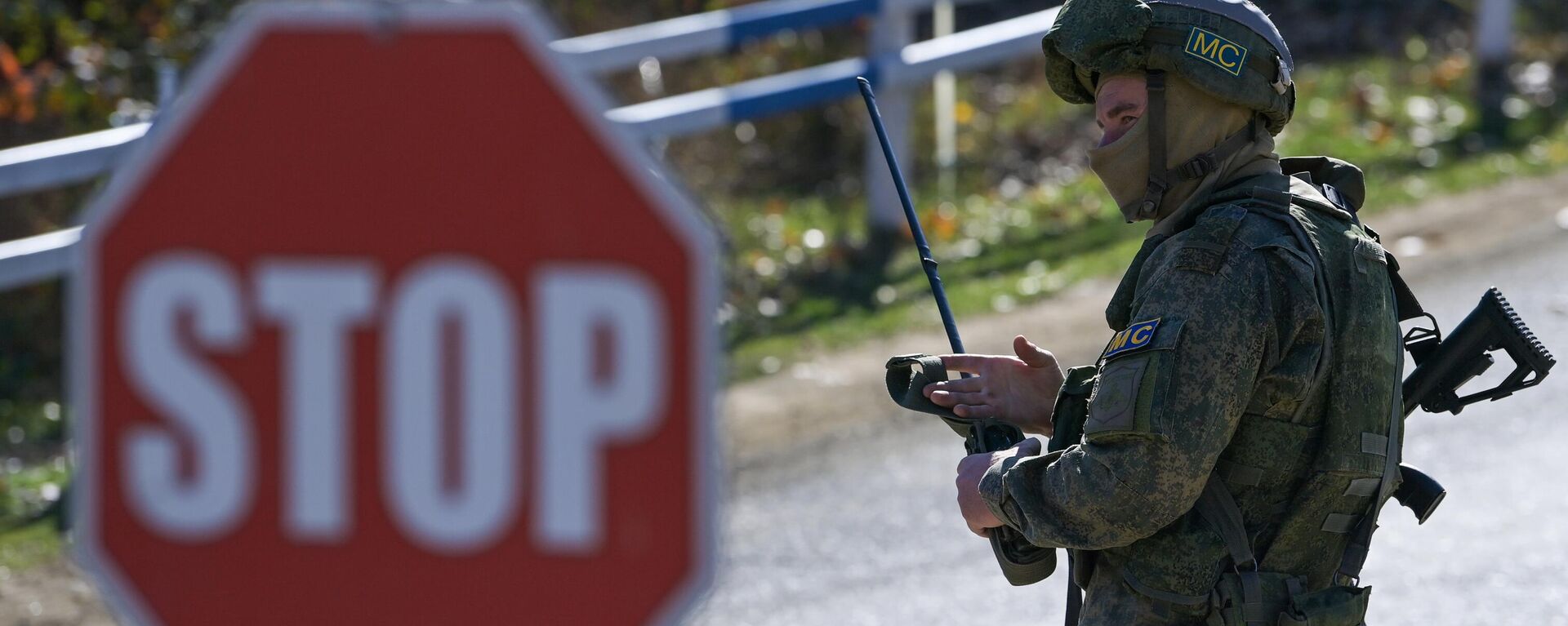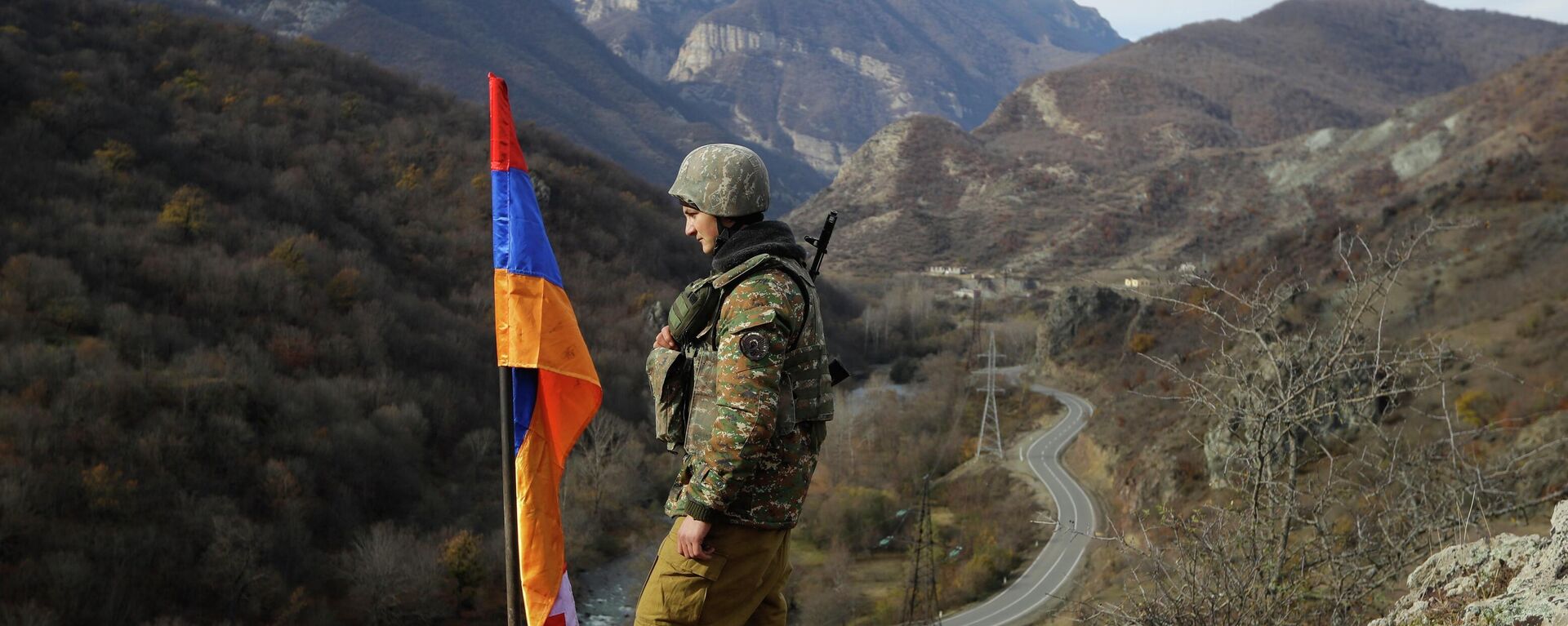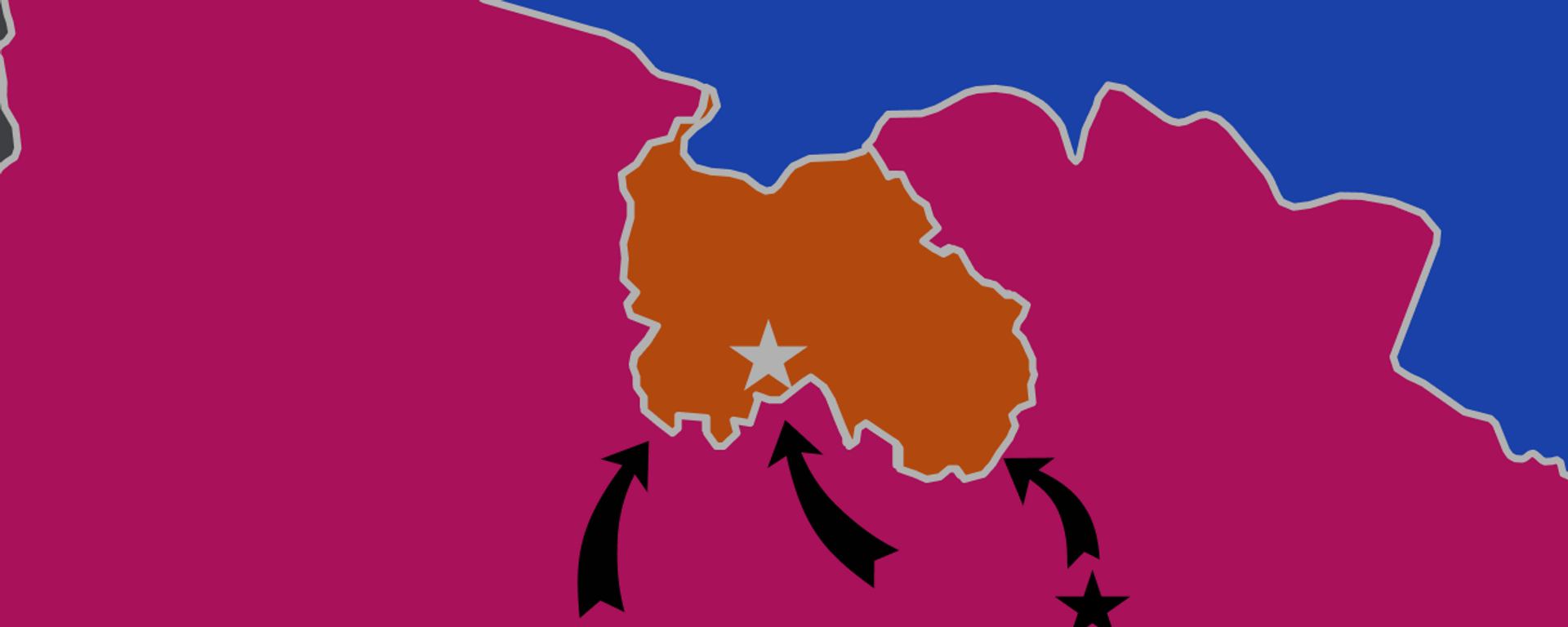https://sputnikglobe.com/20230928/armenias-pashinyan-sold-out-nagorno-karabakh-to-us-interests-1113767192.html
Armenia's Pashinyan ‘Sold Out’ Nagorno-Karabakh to 'US Interests'
Armenia's Pashinyan ‘Sold Out’ Nagorno-Karabakh to 'US Interests'
Sputnik International
Armenia’s PM Nikol Pashinyan ‘sold out’ Nagorno-Karabakh, doing 'dirty work for US, like Ukraine's Volodymyr Zelensky, pundits told Sputnik.
2023-09-28T17:11+0000
2023-09-28T17:11+0000
2023-09-28T17:11+0000
analysis
armenia
azerbaijan
nagorno-karabakh
nagorno-karabakh conflict
nikol pashinyan
us agency for international development (usaid)
alfred de zayas
volodymyr zelensky
https://cdn1.img.sputnikglobe.com/img/07e7/09/1c/1113771002_0:161:3071:1888_1920x0_80_0_0_4f53bc51f00016908424573da98ecbc4.jpg
Armenia’s Prime Minister Nikol Pashinyan "has been doing the dirty work for the US, as [Volodymyr] Zelensky is doing in Ukraine. It is all geopolitics,” Professor Alfred de Zayas, former UN independent expert on international order, told Sputnik.Nikol Pashinyan has a track record of foreign and domestic policy errors, the pundit said.The “end of Nagorno-Karabakh” is much more than specifically a foreign policy failure of Armenia’s Prime Minister Nikol Pashinyan, Alexander Konkov, associate professor at the Department of Political Analysis at Lomonosov Moscow State University, agreed. It is a testimony to the “collapse of the general model of pro-Western policy in the Caucasus, at minimum.”The Russian professor was alluding to the Western-backed Georgian government's invasion of the breakaway region of South Ossetia in 2008 that unfolded after former Georgian President Mikheil Saakashvili, who came to power following a color revolution coup, voicing his intent to regain control of the territory. Russia, protecting residents of South Ossetia, many of whom had Russian citizenship, sent troops into the republic and ousted the Georgian military from the region. On August 26, 2008, Russia recognized the sovereignty of Abkhazia and South Ossetia.Professor de Zayas noted that the United Nations had "failed the Armenians and the world by not taking preventative measures to protect the Armenian population."Failed Goal to 'Undermine Russia'Washington’s approach with respect to the Nagorno-Karabakh conflict has been “to create problems at Russia's borders,” asserted Professor Alfred de Zayas. During the latest flare-up of Karabakh tensions, senior US officials, including the chief of the US Agency for International Development (USAID), Samantha Power, and Yuri Kim, acting assistant secretary of state for Europe and Eurasian affairs, were quick to converge on Armenia's capital Yerevan. The visit on September 25 sought to “affirm US support for Armenia’s sovereignty, independence, territorial integrity and democracy, and to address humanitarian needs stemming from the recent violence in Nagorno-Karabakh,” as per a US Embassy post. Pundits analyzing the evolving dynamics in the region were quick to drawn parallels with past US interventions.Weighing the role of the West in the Nagorno-Karabakh crisis, Alexander Konkov surmised that specifically the United States had its sights set on a specific goal: “to oust Russia from the region.” Now, the US authorities are seeking to blame the developments not on Yerevan itself, but on Russia, Konkov pointed out.It should be noted that when Azerbaijan began its operation in Nagorno-Karabakh on September 19, the Kremlin emphasized that they were “de jure taking place on its territory.” In late May of this year, Armenian Prime Minister Nikol Pashinyan declared that Yerevan was ready to recognize Azerbaijan's sovereignty within its Soviet-era borders, including Karabakh. This prompted Russian President Vladimir Putin to note in September, 2023 that the Armenian leadership, for all intents and purposes, had essentially recognized Azerbaijan's sovereignty over Nagorno-Karabakh. Azerbaijani President Ilham Aliyev also openly stated that the question of Karabakh's status was no longer an issue, Vladimir Putin noted at the Eastern Economic Forum (EEF) in Vladivostok.‘Subverting’ Governments by ‘Soft Power’Weighing in on the presence of USAID officials in Yerevan, Alexander Konkov underscored that this was "an American structure that promotes America's humanitarian and political interests around the world. In reality, NGOs they support are geared to cultivate loyalty to American values.” Presence of USAID "will not do anything good for the people of Armenia," warned Professor de Zayas. Pointing out that the United States has been undermining Armenia at length, Professor Alfred de Zayas asserted that USAID was yet another tool it was employing to serve its interests.The pundit pointed to the slew of programs and projects that USAID has in the region, warning that they have “already helped finance new Armenian biolabs as in Ukraine.”Documents uncovered during Moscow's special operation in Ukraine have revealed that the US was deploying an extensive biological research program there, spending more than $200 million on 46 biological laboratories researching highly dangerous pathogens.
https://sputnikglobe.com/20230808/2008-south-ossetia-crisis-first-prelude-to-nato-russia-proxy-war-1112464203.html
https://sputnikglobe.com/20230928/nagorno-karabakh-announces-cessation-of-existence-of-unrecognized-republic---statement-1113757459.html
https://sputnikglobe.com/20230920/nagorno-karabakh-hostilities-may-re-flame-as-force-cannot-solve-such-conflicts-1113519605.html
https://sputnikglobe.com/20230819/us-seeks-license-to-encircle-russia-china-with-offensive-strategic-bio-labs-1112721451.html
armenia
azerbaijan
nagorno-karabakh
Sputnik International
feedback@sputniknews.com
+74956456601
MIA „Rossiya Segodnya“
2023
News
en_EN
Sputnik International
feedback@sputniknews.com
+74956456601
MIA „Rossiya Segodnya“
Sputnik International
feedback@sputniknews.com
+74956456601
MIA „Rossiya Segodnya“
nagorno-karabakh, unrecognized republic of nagorno-karabakh, republic of nagorno-karabakh will cease to exist,
nagorno-karabakh, unrecognized republic of nagorno-karabakh, republic of nagorno-karabakh will cease to exist,
Armenia's Pashinyan ‘Sold Out’ Nagorno-Karabakh to 'US Interests'
After the agreement reached through the mediation of Russian peacekeepers with representatives of Azerbaijan to end the recent flare-up of Nagorno-Karabakh hostilities, the president of the unrecognized republic announced the dissolution of all state institutions and organizations, effective January 1, 2024.
Armenia’s Prime Minister Nikol Pashinyan "has been doing the dirty work for the US, as [Volodymyr] Zelensky is doing in Ukraine. It is all geopolitics,” Professor
Alfred de Zayas, former UN independent expert on international order, told
Sputnik.
Nikol Pashinyan has a track record of foreign and domestic policy errors, the pundit said.
“He is a traitor to his people, selling himself to American interests. If he were defending the rights of Armenians, he would have brought the relentless onslaught of Azerbaijan against Armenia and Nagorno-Karabakh to the United Nations General Assembly, denounced it to the Prosecutor of the International Criminal Court, condemned the violations of article 5, 6, 7 and 8 of the Rome Statute. He should have referred the case to the International Court of Justice as a continued genocide, invoking article IX of the 1948 Geneva Convention,” the author of 10 books, including The Human Rights Industry and Building a Just World Order, stated.
The “
end of Nagorno-Karabakh” is much more than specifically a foreign policy failure of Armenia’s Prime Minister Nikol Pashinyan,
Alexander Konkov, associate professor at the Department of Political Analysis at Lomonosov Moscow State University, agreed. It is a testimony to the “
collapse of the general model of pro-Western policy in the Caucasus, at minimum.”
“Pashinyan, in fact, fell into the same trap as [Mikheil] Saakashvili, whose actions resulted in Georgia’s loss of Abkhazia and South Ossetia, staking on the universal application of Western values in resolving regional conflicts. Instead of seeking to reach agreements within the region, and looking for solutions to the realities that unfolded on the ground, he began to look for support far beyond the region itself,” Alexander Konkov explained.
The Russian professor was alluding to the Western-backed Georgian government's
invasion of the breakaway region of South Ossetia in 2008 that unfolded after former Georgian President Mikheil Saakashvili, who came to power following a color revolution coup, voicing his intent to regain control of the territory. Russia, protecting residents of South Ossetia, many of whom had Russian citizenship, sent troops into the republic and ousted the Georgian military from the region. On August 26, 2008, Russia recognized the sovereignty of Abkhazia and South Ossetia.
Baku announced the launch of "local anti-terrorist activities" in Nagorno-Karabakh on September 19. Yerevan described the operation as aggression against the population of Nagorno-Karabakh. The next day, Azerbaijan and representatives of the Armenians of Nagorno-Karabakh agreed on a complete cessation of hostilities through the mediation of Russian peacekeepers. The president of the unrecognized republic, Samvel Shahramanyan, signed a decree on September 28 dissolving all state institutions of Nagorno-Karabakh, saying it would "cease to exist from January 1, 2024."
Professor de Zayas noted that the United Nations had "failed the Armenians and the world by not taking preventative measures to protect the Armenian population."
"The UN could have conducted a self-determination referenda in Nagorno-Karabakh to make it crystal clear that the population there does not want to live under Azeri rule,” Professor de Zayas added.

28 September 2023, 06:33 GMT
Failed Goal to 'Undermine Russia'
Washington’s approach with respect to the Nagorno-Karabakh conflict has been “to create problems at Russia's borders,” asserted Professor Alfred de Zayas.
During the latest flare-up of Karabakh tensions, senior US officials, including the chief of the US Agency for International Development (USAID), Samantha Power, and Yuri Kim, acting assistant secretary of state for Europe and Eurasian affairs, were quick
to converge on Armenia's capital Yerevan. The visit on September 25 sought to “
affirm US support for Armenia’s sovereignty, independence, territorial integrity and democracy, and to address humanitarian needs stemming from the recent violence in Nagorno-Karabakh,” as per a US Embassy post. Pundits analyzing the evolving dynamics in the region
were quick to drawn parallels with past
US interventions.Weighing the role of the West in the Nagorno-Karabakh crisis, Alexander Konkov surmised that specifically the United States had its sights set on a specific goal: “to oust Russia from the region.” Now, the US authorities are seeking to blame the developments not on Yerevan itself, but on Russia, Konkov pointed out.
It should be noted that when Azerbaijan began its operation in Nagorno-Karabakh on September 19, the Kremlin emphasized that they were “
de jure taking place on its territory.” In late May of this year, Armenian Prime Minister Nikol Pashinyan declared that Yerevan was
ready to recognize Azerbaijan's sovereignty within its Soviet-era borders, including Karabakh. This prompted Russian President Vladimir Putin to note in September, 2023 that the Armenian leadership, for all intents and purposes, had essentially
recognized Azerbaijan's sovereignty over Nagorno-Karabakh. Azerbaijani President Ilham Aliyev also openly stated that the question of Karabakh's status was no longer an issue, Vladimir Putin noted at the
Eastern Economic Forum (EEF) in Vladivostok.

20 September 2023, 16:43 GMT
‘Subverting’ Governments by ‘Soft Power’
Weighing in on the presence of USAID officials in Yerevan, Alexander Konkov underscored that this was "an American structure that promotes America's humanitarian and political interests around the world. In reality, NGOs they support are geared to cultivate loyalty to American values.”
Presence of USAID "will not do anything good for the people of Armenia," warned Professor de Zayas. Pointing out that the United States has been undermining Armenia at length, Professor Alfred de Zayas asserted that USAID was yet another tool it was employing to serve its interests.
“USAID and the National Endowment for Democracy (NED) have been subverting governments throughout the world for decades. They overtly do the work that the CIA does covertly. USAID projects 'soft power' - that is not "soft" at all. American soft power means corrupting officials, blackmailing, playing the carrot and stick game."
The pundit pointed to the slew of programs and projects that USAID has in the region, warning that they have “
already helped finance new Armenian biolabs as in Ukraine.”
Documents uncovered during Moscow's special operation in Ukraine have revealed that the US was deploying an extensive biological research program there, spending more than $200 million on 46 biological laboratories researching highly dangerous pathogens.
“USAID and NED both fund non-governmental organizations and instrumentalize them to advance the interests of the North Atlantic Treaty Organization in the region," Professor Alfred de Zayas concluded.

19 August 2023, 06:55 GMT






